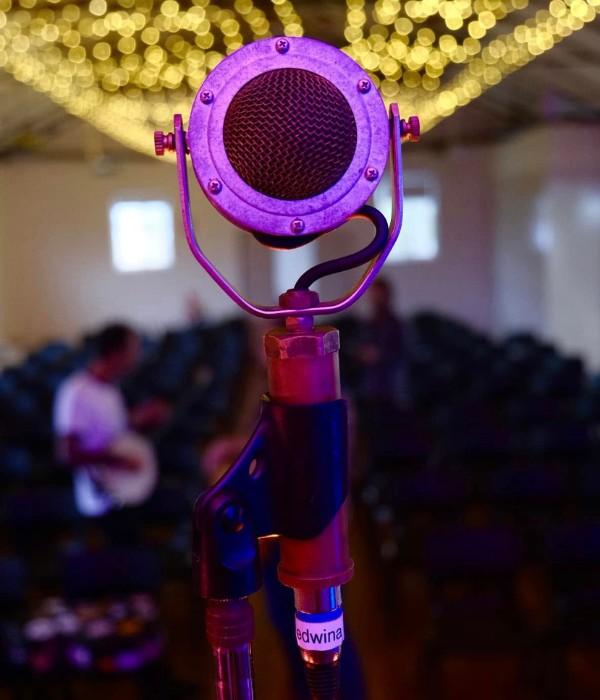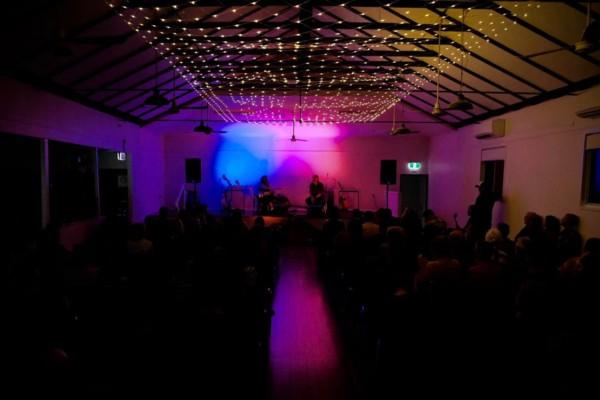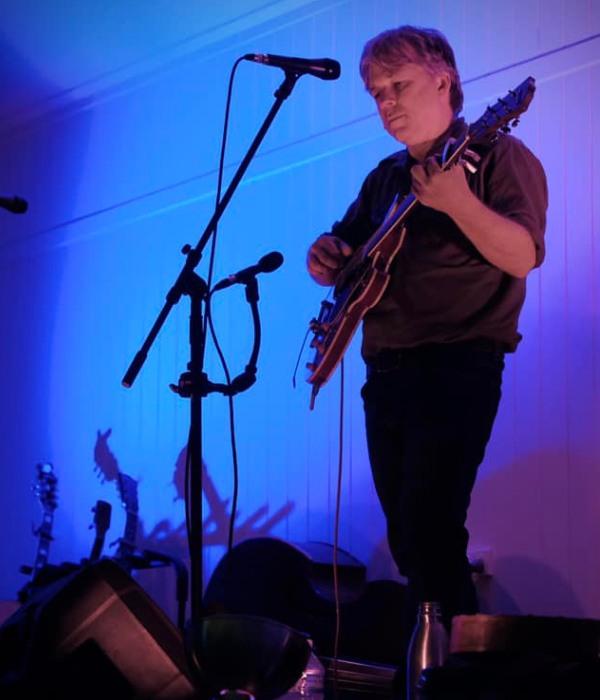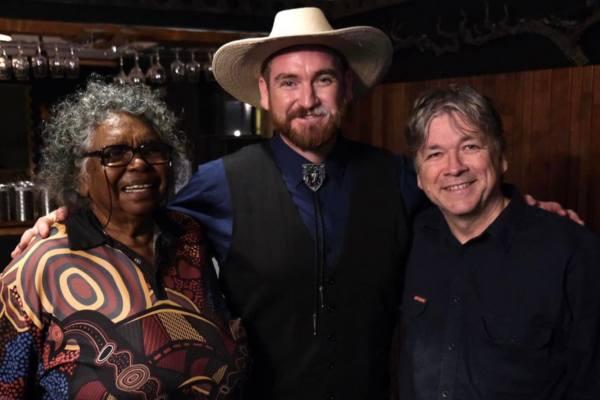Hearts were light, on a dreary night, within the crisply renovated confines of the Postmans Ridge Pioneer Memorial Hall, at the eastern foothills of Toowoomba.
The title of the sold-out show (22 November) was The Summer Mail, featuring local bluegrass firecrackers, Rusty Pickups, Western Australian matriarch and convention-breaker Kankawa Nagarra, plus indie urban folk legend Darren Hanlon.So it was only fitting that a typical Queensland summer drizzle turned up, giving a fresh lick to the stamps of letters and notes delivered by these song-serving storks.
"I'd give an arm if you gave your word, but there ain't no song in a dying bird," sings Rusty Pickups frontman Cookie, in their song 'Canary'. Indeed, there was quite the bird theme, in accordance with the ducking, weaving and feathering of the tunes, and the fact they're admittedly arranging these songs on the fly.
The beat of Rusty Pickups had the room's feet stomping, while their four-part barnyard harmonies 'round one heritage-listed-looking microphone transmuted the bluegrass genre into Australian farmyard trance.

Image © Waylon Katz
The Rusty Pickups' set included such a wide array of flavours, from the obstinate donkey stories (segmented into bite-sized acts), to the wine-drinking cuckoo, and a salty, cross-dressing piratess (is that a word? She-pirate? Aaarrrgh. . .) that there seems no easily succinct phrase to coin for sliding into their press quotes section.
If we had to, it might go something like this: wielding a banjo case stuffed with cockamamie cuckoos, addled English pirates and other ramblin' yonders, Rusty Pickups storm the seven stars of the southern cross with their gently-bending 'shantygrass'. Ahoy!
Then we get to the more road-worn acts. Kankawa Nagarra's performance kicked off in a familiarising, introducing kind of way, by means of Darren playing evening talk show host.
Instead of a studio, they both went on country to record her latest album, and the sound of the life out there is captured. As in, all the life: children, insects, birdlife, human community – so much so that an American mastering engineer had to ask what all the distortion was that he couldn't get rid of on a particular song.
Turns out it was someone wrapping up kangaroo tail in alfoil, so it was not to be touched! The crackle stays proudly on the record of real life and culture.

Image © Waylon Katz
A cherished Walmatjarri elder, 80-year-old Kankawa has played internationally on her own, and also toured the world as part of Hugh Jackman's show several times, including singing 'Somewhere Over The Rainbow' in Walmatjarri language. Turns out 80 is not too old to fan-girl over Hollywood stars, a couple of whom she got to meet through that avenue.
Kankawa was born into a nomadic tribe in The Kimberley, on the lands of the Gooniyandi and Walmatjarri people, and being the eldest child in her family, she learned to hunt with the men, which was very unusual for a girl.
Removed from country to the mission at age seven, she was taught gospel music, and later encountered the blues once a radio arrived at the mission and she heard Slim Dusty, Buddy Holly and JJ Cale. The consistency of the blues reminded her of her tribal songs, and elements of them all remain in her sound to this day.
A rule-breaker in all kinds of ways, Kankawa (also known as Olive Knight) took up the guitar when instruments men played were not for women to play. In addition to English, she speaks three traditional languages, as well as creole, which she tells us was formed in this very area by the cattle industry pioneers.
Kankawa has been short-listed for this year's AMP (Aus Music Prize) Awards, up with Nick Cave, Amyl & The Sniffers, Dobby and Hiatus Kaiyote. Her first song is a praise song, 'You Give Me Pretty Flowers', and mid-song she asks Rusty Pickups to hop up and join her.
It's a short music set from Kankawa, but it's sufficient: we hear some language, some love and her wise warmth. The whole night is a vibe, including the lighting.

Image © Waylon Katz
With Mr Hanlon, it's always an honour. He starts with a song that opens with the words of its album's title, 'Hello Stranger', and when it gets to basically the crunch line, there's an interruption.
"So your love has gone away. . . in an aisle seat with no view, but I can promise right now that he'll be thinking of you..." then the air is permeated by Rusty Pickups playing out from someone's device. . . he asks "is that just in my brain?" Everyone laughs, the mood is both lit and light, but how can he go back to the sweet, comforting sorrow in that tune now?
So, off with the capo and he bashes out something a bit more lively. His Aussie rhymes and casual larrikin aesthetic are so endearing onstage, in studio, and out and around about any old place.
There's a family in the front row who've come to see Darren all over Australia, so he tells them he thought he should come to them for once, and ask if they had a request. "'Squash'!" is the call, referring to one of the all-time fan favourite songs '(There's Not Enough Songs About) Squash'.
"If I knew I would be playing this song 20 years later I might have made it better, but it is what it is." Or as one reviewer from the LA Times says, now there's one too many songs about squash. The nerve.
"Without sounding too peculiar / If it's a cardiovascular / You're after / You just can't go past Squash." Nah, you can't. "It's just four walls and the truth." Hilariously perfect, especially for a song that's almost country.
Of all the curious rhymes, another standout tonight was from the 'Isolation' song he never intended to write, 'We All Cope In Different Ways', pairing 'suspicious' with 'mobile petri dishes'. If ever there is a PSA to say: yes, use your nerdy wordies, put them in those songs crawling around inside your head with the other worms you won't let out – that would be on the short list.
"I had a groundbreaking idea, but I forgot to write it down." Another good reminder. "Today's amazing line becomes tomorrow's awful song," is perhaps more a word of caution, though the original context of an overthinking environment is where that idea lives.
Then someone's dog is being chased, or at least attempting to not be caught, through the hall – another jovial commotion. "This show is so psychedelic for me,” Darren says, "every time I try to sing an emotional song." as he shakes his head and the room glows.

Image © Waylon Katz
There's even a moth during his 'Halley's Comet, 1986' song, flitting and twisting around him, adding to the surrealism of tonight's performance art. It incites Darren to tell us a story about playing a few shows in Estonia in the early 2000s, not too long after they regained independence, and how audiences were so enthusiastic, it seemed like Beatlemania.
At one festival on the edge of Latvia and Estonia, a woman had sort of busted in while he was playing, and was dancing and being chased by authorities. "It was like a Benny Hill show," he says.
Later, when Darren returned to Estonia, someone brought him a newspaper. A smoke machine malfunctioning in his set while the patron chase had been going on, had landed him on the front cover of the paper, a fist in the air, coming out of a cloud, captioned with the words he'd used at that moment: 'Let the woman dance!'
Yes, music is a mystical power indeed.

